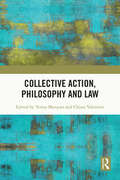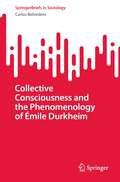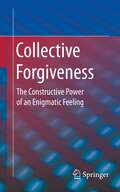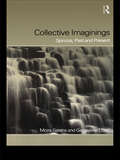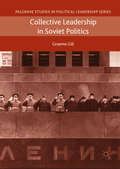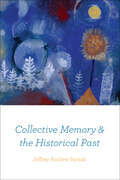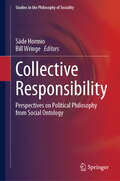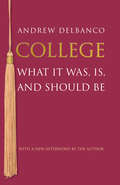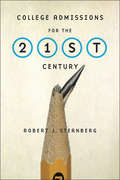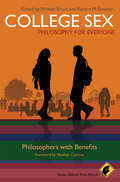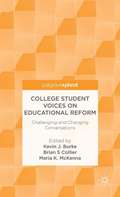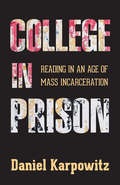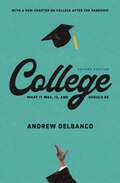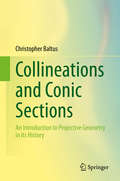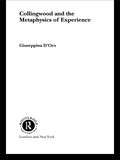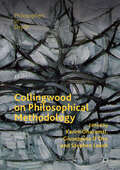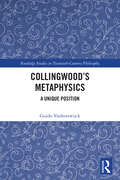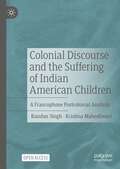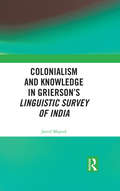- Table View
- List View
Collective Action under the Articles of Confederation
by Keith L. DoughertyRather than focusing on why the states did not contribute to the national government under the Articles of Confederation, Collective Action under the Articles of Confederation asks why they, in fact, did - even when they should not have been expected to contribute. Why did states pay large portions of their requisitions to the federal government when problems of collective action and the lack of governmental incentives suggest that they should not have? Using original data on Continental troop movements and federal debt holdings within each state, in this 2001 book, Dougherty shows that states contributed to the national government when doing so produced local gains. Such a theory stands in stark contrast to the standard argument that patriotism and civic duty encouraged state cooperation. Material incentives and local interests bound the union together and explained the push for constitutional reform more than the common pursuit of mutual goals.
Collective Action, Philosophy and Law
by Chiara Valentini Teresa MarquesCollective Action, Philosophy and Law brings together two important strands of philosophical analysis. It combines general philosophical inquiry into collective agency with analyses of specific questions about plural entities and activities in the legal domain. These are issues of growing interest in areas of philosophy like action theory and social ontology, as well as in philosophy of law. The book contains thirteen original chapters written by an international team of leading philosophers and legal theorists, and is divided into four clear parts: The nature of law and of legislative intention Practical reasoning and duties Causality, blameworthiness, and responsibility Citizens, states, and institutions. These sections cut across, and build on, different accounts to advance the debate on classical and new issues in collective agency. Each part also features legal-philosophical analyses that draw on general accounts of collective agency to cast new light on the law, descriptive as well as normatively. Collective Action, Philosophy and Law is the first major interdisciplinary and multi-authored work bridging legal and philosophical approaches to collective agency. As such, it is essential reading for students and researchers of philosophy of law, ethics, political philosophy, jurisprudence, and legal theory.
Collective Consciousness and the Phenomenology of Émile Durkheim (SpringerBriefs in Sociology)
by Carlos BelvedereThe book is addressed to scholars and students in sociology and in phenomenological philosophy. It presents the work of Durkheim in a new light and discusses the prevailing interpretations in the collective intentionality approach. It also provides a fresh conception of collective consciousness which illuminates features unattended by the traditions initiated by John Searle, Dan Zahavi and the Center for Subjectivity Research, and the Nordic Society of Phenomenology. This lucidly written book is of interest to students and scholars researching Durkheim's, Husserl’s and Schutz’s works.
Collective Dreams: Political Imagination and Community (G - Reference, Information and Interdisciplinary Subjects)
by Keally D. McBrideHow do we go about imagining different and better worlds for ourselves? Collective Dreams looks at ideals of community, frequently embraced as the basis for reform across the political spectrum, as the predominant form of political imagination in America today. Examining how these ideals circulate without having much real impact on social change provides an opportunity to explore the difficulties of practicing critical theory in a capitalist society. Different chapters investigate how ideals of community intersect with conceptions of self and identity, family, the public sphere and civil society, and the state, situating community at the core of the most contested political and social arenas of our time. Ideals of community also influence how we evaluate, choose, and build the spaces in which we live, as the author’s investigations of Celebration, Florida, and of West Philadelphia show.Following in the tradition of Walter Benjamin, Keally McBride reveals how consumer culture affects our collective experience of community as well as our ability to imagine alternative political and social orders.Taking ideals of community as a case study, Collective Dreams also explores the structure and function of political imagination to answer the following questions: What do these oppositional ideals reveal about our current political and social experiences? How is the way we imagine alternative communities nonetheless influenced by capitalism, liberalism, and individualism? How can these ideals of community be used more effectively to create social change?
Collective Forgiveness: The Constructive Power of an Enigmatic Feeling
by Oliver ErrichielloIn this age of a hyper-complex and totally interconnected world that no longer knows pauses, forgiveness is essential. The author explains that collective forgiveness is in no way inferior to love in its mysteriousness. We humans are unfathomable beings. Although we usually act thoughtfully and rationally, many actions and decisions cannot seem to be logically derived. Forgiveness - everyone knows it and has experienced it - is one of them. Forgiveness is one of the most important and exciting phenomena of human communication. The book answers questions such as: Why do we forgive some people and not others? Why does forgiveness take time? Why have people always forgiven each other - or rejected the very act of forgiving? Do we forgive individuals in a personal environment more easily or we more hesitant than with a group of people? And most importantly, why is collective forgiveness effective across time and cultures? The book is thought-provoking and offers valuable impulses to better understand one's own and social actions.This book is a translation of the original German 1st edition Kollektives Verzeihen by Oliver Errichiello, published by Springer-Verlag GmbH, DE, part of Springer Nature in 2021. The translation was done with the help of artificial intelligence (machine translation by the service DeepL.com). A subsequent human revision was done primarily in terms of content, so that the book will read stylistically differently from a conventional translation. Springer Nature works continuously to further the development of tools for the production of books and on the related technologies to support the authors.
Collective Imaginings: Spinoza, Past and Present
by Moira Gatens Genevieve LloydWhy would the work of the 17th century philosopher Benedict de Spinoza concern us today? How can Spinoza shed any light on contemporary thought?In this intriguing book, Moira Gatens and Genevieve Lloyd show us that in spite of or rather because of Spinoza's apparent strangeness, his philosophy can be a rich resource for cultural self-understanding in the present.Collective Imaginings draws on recent re-assessments of the philosophy of Spinoza to develop new ways of conceptualising issues of freedom and difference. This ground-breaking study will be invaluable reading to anyone wishing to gain a fresh perspective on Spinoza's thought.
Collective Leadership in Soviet Politics (Palgrave Studies In Political Leadership Ser.)
by Graeme GillThis book studies the way in which the top leadership in the Soviet Union changed over time from 1917 until the collapse of the country in 1991. Its principal focus is the tension between individual leadership and collective rule, and it charts how this played out over the life of the regime. The strategies used by the most prominent leader in each period – Lenin, Stalin, Khrushchev, Brezhnev and Gorbachev – to acquire and retain power are counterposed to the strategies used by the other oligarchs to protect themselves and sustain their positions. This is analyzed against the backdrop of the emergence of norms designed to structure oligarch politics. The book will appeal to students and scholars interested in the fields of political leadership, Soviet politics and Soviet history.
Collective Memory and the Historical Past
by Jeffrey Andrew BarashThere is one critical way we honor great tragedies: by never forgetting. Collective remembrance is as old as human society itself, serving as an important source of social cohesion, yet as Jeffrey Andrew Barash shows in this book, it has served novel roles in a modern era otherwise characterized by discontinuity and dislocation. Drawing on recent theoretical explorations of collective memory, he elaborates an important new philosophical basis for it, one that unveils important limitations to its scope in relation to the historical past. Crucial to Barash's analysis is a look at the radical transformations that the symbolic configurations of collective memory have undergone with the rise of new technologies of mass communication. He provocatively demonstrates how such technologies' capacity to simulate direct experience--especially via the image--actually makes more palpable collective memory's limitations and the opacity of the historical past, which always lies beyond the reach of living memory. Thwarting skepticism, however, he eventually looks to literature--specifically writers such as Marcel Proust, Walter Scott, and W. G. Sebald--to uncover subtle nuances of temporality that might offer inconspicuous emblems of a past historical reality.
Collective Responsibility: Perspectives on Political Philosophy from Social Ontology (Studies in the Philosophy of Sociality)
by Säde Hormio Bill WringeThis book provides a comprehensive overview of the ways in which the concept of collective responsibility is relevant to ongoing normative debates in social and political philosophy. Individual chapters address issues such as the relationship between collective obligations and collective responsibility, the kinds of groups which can be the subjects of collective responsibility and obligations, and the relationship between the obligations of groups and the obligations of individual members of those groups. The book also puts these concepts to work in a number of applied cases, including questions around corporate responsibility and responsibility of AI, or debates about the responsibilities of individuals in relationship to questions about state wrong-doing, or the obligations of allies of marginalised social groups. The guiding principle of the book is that by taking both the theoretical and the applied issues seriously, we can gain new insights into the structure of collective responsibility and its practical implications. In addition to drawing on technical contributions of social ontology, the book is interested in what our real-life practices reveal to us about collective responsibility. The further question is should some of our institutional practices be revised in light of the implicit ontological claims that they make. This book appeals to academics and students in philosophy, political theory and legal studies, especially graduates and postgraduates.
College
by Andrew DelbancoAs the commercialization of American higher education accelerates, more and more students are coming to college with the narrow aim of obtaining a preprofessional credential. The traditional four-year college experience--an exploratory time for students to discover their passions and test ideas and values with the help of teachers and peers--is in danger of becoming a thing of the past. In College, prominent cultural critic Andrew Delbanco offers a trenchant defense of such an education, and warns that it is becoming a privilege reserved for the relatively rich. In arguing for what a true college education should be, he demonstrates why making it available to as many young people as possible remains central to America's democratic promise. In a brisk and vivid historical narrative, Delbanco explains how the idea of college arose in the colonial period from the Puritan idea of the gathered church, how it struggled to survive in the nineteenth century in the shadow of the new research universities, and how, in the twentieth century, it slowly opened its doors to women, minorities, and students from low-income families. He describes the unique strengths of America's colleges in our era of globalization and, while recognizing the growing centrality of science, technology, and vocational subjects in the curriculum, he mounts a vigorous defense of a broadly humanistic education for all. Acknowledging the serious financial, intellectual, and ethical challenges that all colleges face today, Delbanco considers what is at stake in the urgent effort to protect these venerable institutions for future generations. In a new preface, Delbanco addresses recent events that threaten the future of the institution.
College Admissions for the 21st Century
by Robert J. SternbergSATs, ACTs, GPAs. Everyone knows that these scores can’t tell a college everything that’s important about an applicant. But what else should admissions officers look for, and how can they know it when they see it? In College Admissions for the 21st Century a leading researcher on intelligence and creativity offers a bold and practical approach to college admissions testing. Standardized tests are measures of memory and analytical skills. But the ever-changing global society beyond a college campus needs more than just those qualities, argues Robert Sternberg. Tomorrow’s leaders and citizens also need creativity, practicality, and wisdom. How can the potential for those complex qualities be measured? One answer is “Kaleidoscope,” a new initiative in undergraduate admissions, first used at Tufts University. Its open-ended questions for applicants, and the means used to score the answers, gives applicants and admissions officers the chance to go beyond standardized tests. Does it work? As Sternberg describes in detail, Kaleidoscope measures predicted first-year academic success, over and above SATs and high school GPAs, and predicted first-year extracurricular activities, leadership, and active citizenship as well. And every year that Kaleidoscope measures were used, the entering class’s average SATs and high school GPAs went up too. What worked at Tufts can work elsewhere. New kinds of assessments, like Kaleidoscope, can liberate many colleges and students from the narrowness of standardized tests and inspire new approaches to teaching for new kinds of talented, motivated citizens of the world.
College Sex - Philosophy for Everyone: Philosophers With Benefits (Philosophy for Everyone #33)
by Fritz AllhoffWritten with insight and humor, College Sex - Philosophy for Everyone investigates a broad array of philosophical issues relating to student sex. Examines the ethical issues of dating, cheating, courtship, homosexual experimentation, and drug and alcohol use Considers student-teacher relationships, sexual experimentation, the meaning of sex in a college setting and includes two essays based on influential research projects on ‘friends with benefits’ Many of the authors teach classes that explore the philosophy of love and sex, and most are scholars from the Society of the Philosophy of Sex and Love
College Student Voices on Educational Reform: Challenging and Changing Conversations (Palgrave Pivot)
by Kevin J. Burke Brian S Collier Maria K. MckennaThis text critically addresses, through college student voices, the American school reform movement in its rhetoric, policy, and practice. It demonstrates how university courses can be designed to treat students as engaged citizens and contextualizes students' voices in the private university and the public sphere.
College Students with ADHD: Current Issues and Future Directions
by Lisa L. Weyandt George J. DupaulNot long ago, conventional wisdom held that ADHD was a disorder of childhood only--that somewhere during puberty or adolescence, the child would outgrow it. Now we know better: the majority of children with the disorder continue to display symptoms throughout adolescence and into adulthood. It is during the teen and young adult years that the psychological and academic needs of young people with ADHD change considerably, and clinical and campus professionals are not always sufficiently prepared to meet the challenge. College Students with ADHD is designed to bring the professional reader up to speed. The book reviews the latest findings on ADHD in high school and college students, assessment methods, and pharmacological and nonpharmacological interventions. Practical guidelines are included for helping young adults make the transition to college, so they may cope with their disorder and do as well as possible in school and social settings. Coverage is straightforward, realistic, and geared toward optimum functioning and outcomes. Among the topics featured: - Background information, from current statistics to diagnostic issues. - ADHD in high school adolescents. - ADHD in college students: behavioral, academic, and psychosocial functioning. - Assessment of ADHD in college students. - Psychosocial/educational treatment of ADHD in college students. - Pharmacotherapy for college students with ADHD. - Future directions for practice and research. The comprehensive information in College Students with ADHD provides a wealth of information to researchers and professionals working with this population, including clinical and school psychologists, school and college counselors, special education teachers, social workers, developmental psychologists, and disability support staff on college campuses, as well as allied mental health providers.
College in Prison: Reading in an Age of Mass Incarceration
by Daniel KarpowitzOver the years, American colleges and universities have made various efforts to provide prisoners with access to education. However, few of these outreach programs presume that incarcerated men and women can rise to the challenge of a truly rigorous college curriculum. The Bard Prison Initiative is different.College in Prison chronicles how, since 2001, Bard College has provided hundreds of incarcerated men and women across the country access to a high-quality liberal arts education. Earning degrees in subjects ranging from Mandarin to advanced mathematics, graduates have, upon release, gone on to rewarding careers and elite graduate and professional programs. Yet this is more than just a story of exceptional individuals triumphing against the odds. It is a study in how the liberal arts can alter the landscape of some of our most important public institutions giving people from all walks of life a chance to enrich their minds and expand their opportunities. Drawing on fifteen years of experience as a director of and teacher within the Bard Prison Initiative, Daniel Karpowitz tells the story of BPI’s development from a small pilot project to a nationwide network. At the same time, he recounts dramatic scenes from in and around college-in-prison classrooms pinpointing the contested meanings that emerge in moments of highly-charged reading, writing, and public speaking. Through examining the transformative encounter between two characteristically American institutions—the undergraduate college and the modern penitentiary—College in Prison makes a powerful case for why liberal arts education is still vital to the future of democracy in the United States.
College: What It Was, Is, and Should Be
by Andrew DelbancoAs the commercialization of American higher education accelerates, more and more students are coming to college with the narrow aim of obtaining a preprofessional credential. The traditional four-year college experience--an exploratory time for students to discover their passions and test ideas and values with the help of teachers and peers--is in danger of becoming a thing of the past. In College, prominent cultural critic Andrew Delbanco offers a trenchant defense of such an education, and warns that it is becoming a privilege reserved for the relatively rich. In arguing for what a true college education should be, he demonstrates why making it available to as many young people as possible remains central to America's democratic promise. In a brisk and vivid historical narrative, Delbanco explains how the idea of college arose in the colonial period from the Puritan idea of the gathered church, how it struggled to survive in the nineteenth century in the shadow of the new research universities, and how, in the twentieth century, it slowly opened its doors to women, minorities, and students from low-income families. He describes the unique strengths of America's colleges in our era of globalization and, while recognizing the growing centrality of science, technology, and vocational subjects in the curriculum, he mounts a vigorous defense of a broadly humanistic education for all. Acknowledging the serious financial, intellectual, and ethical challenges that all colleges face today, Delbanco considers what is at stake in the urgent effort to protect these venerable institutions for future generations.
College: What It Was, Is, and Should Be - Second Edition (The William G. Bowen Series #126)
by Andrew DelbancoThe strengths and failures of the American college, and why liberal education still mattersAs the commercialization of American higher education accelerates, more and more students are coming to college with the narrow aim of obtaining a preprofessional credential. The traditional four-year college experience—an exploratory time for students to discover their passions and test ideas and values with the help of teachers and peers—is in danger of becoming a thing of the past.In College, prominent cultural critic Andrew Delbanco offers a trenchant defense of such an education, and warns that it is becoming a privilege reserved for the relatively rich. In describing what a true college education should be, he demonstrates why making it available to as many young people as possible remains central to America's democratic promise.In a brisk and vivid historical narrative, Delbanco explains how the idea of college arose in the colonial period from the Puritan idea of the gathered church, how it struggled to survive in the nineteenth century in the shadow of the new research universities, and how, in the twentieth century, it slowly opened its doors to women, minorities, and students from low-income families. He describes the unique strengths of America’s colleges in our era of globalization and, while recognizing the growing centrality of science, technology, and vocational subjects in the curriculum, he mounts a vigorous defense of a broadly humanistic education for all. Acknowledging the serious financial, intellectual, and ethical challenges that all colleges face today, Delbanco considers what is at stake in the urgent effort to protect these venerable institutions for future generations.
Collineations and Conic Sections: An Introduction to Projective Geometry in its History
by Christopher BaltusThis volume combines an introduction to central collineations with an introduction to projective geometry, set in its historical context and aiming to provide the reader with a general history through the middle of the nineteenth century. Topics covered include but are not limited to:The Projective Plane and Central CollineationsThe Geometry of Euclid's ElementsConic Sections in Early Modern EuropeApplications of Conics in HistoryWith rare exception, the only prior knowledge required is a background in high school geometry. As a proof-based treatment, this monograph will be of interest to those who enjoy logical thinking, and could also be used in a geometry course that emphasizes projective geometry.
Collingwood and the Metaphysics of Experience (Routledge Studies in Twentieth-Century Philosophy)
by Giuseppina D'OroGiuseppina D'Oro explores Collingwood's work in epistemology and metaphysics, uncovering his importance beyond his better known work in philosophy of history and aesthetics. This major contribution to our understanding of one of the most important figures in history of philosophy will be essential reading for scholars of Collingwood and all students of metaphysics and the history of philosophy.
Collingwood on Philosophical Methodology (Philosophers in Depth)
by Stephen Leach Karim Dharamsi Giuseppina D'OroThis book discusses Collingwood's conception of the role and character of philosophical analysis. It explores questions, such as, is there anything distinctive about the activity of philosophizing? If so, what distinguishes philosophy from other forms of inquiry? What is the relation between philosophy and science and between philosophy and history? For much of the twentieth century, philosophers philosophized with little self-awareness; Collingwood was exceptional in the attention he paid to the activity of philosophizing. This book will be of interest both to those who are interested in Collingwood’s philosophy and, more generally, to all who are interested in the question ‘what is philosophy?’
Collingwood’s Metaphysics: A Unique Position (Routledge Studies in Twentieth-Century Philosophy)
by Guido VanheeswijckThis book explores R.G. Collingwood’s concept of metaphysics. It traces the evolution of Collingwood’s thought on metaphysics through his published work, posthumously published manuscripts and recently discovered course notes.From 1933 to 1936, Collingwood’s thought shifted considerably from the more orthodox Hegelian treatment of metaphysics as the study of the general nature of reality to the more ‘historicist’ study of absolute presuppositions. This radical conversion hypothesis has been for a long time the single most important issue in the interpretation of Collingwood’s philosophy. This book provides a fresh reappraisal of his thinking on metaphysics during these crucial years. It argues that objective idealism is the key to unraveling the true scope of Collingwood’s metaphysics. This theory takes a mid- position between mainstream interpretations in the secondary literature and forms the background to many of Collingwood’s key ideas regarding metaphysics, the philosophy of nature and the philosophy of history. The book also compares Collingwood’s concept of metaphysics to that of his predecessors, contemporaries and followers. The second part of the book focuses in detail on the similarities and differences between Collingwood’s metaphysics and, in chronological order, the views on metaphysics of Dilthey, Whitehead, Ayer, Wittgenstein, Heidegger, Berlin, Kołakowski, Strawson and Taylor.Collingwood’s Metaphysics will be of interest to scholars and graduate students interested in Collingwood’s philosophy, 20th- century philosophy and metaphysics.
Colloquies on Society
by Robert SoutheyA 19th-Century author examines the questions of society in the form of discussions with the ghost of Sir Thomas More.
Colonial Discourse and the Suffering of Indian American Children: A Francophone Postcolonial Analysis
by Kundan Singh Krishna MaheshwariEuro-American misrepresentations of the non-West in general, and in particular on Hinduism and ancient India, run deep and have far greater colonial connections than that have been exposed in academia. This book analyzes the psycho-social consequences that Indian American children face after they are exposed to the school textbook discourse on Hinduism and ancient India. The authors show that there is an intimate connection—an almost exact correspondence—between James Mill’s colonial-racist discourse and the current school-textbook discourse. The very parameters and coordinates on which James Mill constructed the discourse are the ones that are being used to describe Hinduism, Hindus, and ancient India in the textbooks currently. Consequently, this archaic and racist discourse, camouflaged under the cover of political correctness, produces in the Indian American children a psychological impact quite similar to what racism is known to produce: shame, inferiority, embarrassment, identity confusion, assimilation, and a phenomenon similar to racelessness where the children dissociate from the tradition and culture of their ancestors. This book argues that the current school textbook discourse on Hinduism and India needs to change so that the Indian American children do not become victims of overt and covert racism. For the change to occur, the first step is to recognize the overarching and pervasive influence of the colonial-racist discourse of James Mill on the textbooks. For the reconstruction of the discourse to take place, the first step is to engage in a through deconstruction, which is what the book attempts.
Colonialism and Knowledge in Grierson’s Linguistic Survey of India
by Javed MajeedThis book is the first detailed examination of George Abraham Grierson’s Linguistic Survey of India, one of the most complete sources on South Asian languages. It shows that the Survey was characterised by a composite and collaborative mode of producing knowledge, which undermines any clear distinctions between European orientalists and colonised Indians in British India. Its authority lay more in its stress on the provisional nature of its findings, an emphasis on the approximate nature of its results, and a strong sense of its own shortcomings and inadequacies, rather than in any expression of mastery over India’s languages. The book argues that the Survey brings to light a different kind of colonial knowledge, whose relationship to power was much more ambiguous than has hitherto been assumed for colonial projects in modern India. It also highlights the contribution of Indians to the creation of colonial knowledge about South Asia as a linguistic region. Indians were important collaborators and participants in the Survey, and they helped to create the monumental knowledge of India as a linguistic region which is embodied in the Survey. This volume, like its companion volume Nation and Region in Grierson’s Linguistic Survey of India, will be a great resource for scholars and researchers of linguistics, language and literature, history, political studies, cultural studies and South Asian studies.
Colonialism and Neocolonialism
by Jean-Paul SartreColonialism and Neo-Colonialism is a classic critique of France's policies in Algeria in the 1950s and 1960s and inspired much subsequent writing on colonialism, post-colonialism, politics, and literature. It includes Sartre's celebrated preface to Fanon's classic Wretched of the Earth. Colonialism and Neo-Colonialism had a profound impact on French intellectual life, inspiring many other influential French thinkers and critics of colonialism such as Jean-Francois Lyotard, Frantz Fanon, Pierre Bourdieu and Jacques Derrida.

